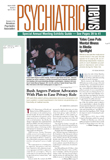Now that AIDS, with its complex interaction of biologic and psychiatric symptoms, is the fourth-leading cause of death worldwide, it is critical that APA maintain a strong commitment to addressing the disease’s neuropsychiatric and behavioral manifestations, said Marshall Forstein, M.D., at the March meeting of the APA Board of Trustees.
If organized psychiatry fails to ensure that HIV/AIDS has a prominent place in its agenda, it will sacrifice care of HIV-infected patients to psychologists and neurologists, he emphasized, who often seem more involved in AIDS care than are psychiatrists, he cautioned.
Forstein, chair of the APA Commission on AIDS, stressed that “psychiatrists must be prepared for new challenges” in treating people with HIV infection or full-blown AIDS. One, paradoxically, stems from advances in treating the disease. The longer life span to which many people with AIDS can now look forward thanks to various combinations of antiretroviral drugs will also mean an increased need for psychiatric services, he noted.
In addition, since these antiretrovirals don’t penetrate the brain very well, patients whose bodies otherwise respond to the drugs are still likely to suffer from cognitive impairment. And for those with pre-existing severe mental illness or significant substance abuse, the assessment of cognitive capacity is particularly complex, Forstein pointed out.
Psychiatric involvement in the epidemic is also crucial, he added, because “for the medically ill patient on many medications, potential complex drug interactions require a sophisticated psychiatric approach to the HIV-infected patient.”
Forstein pointed out that the APA AIDS Education Project, funded through grants from the federal Center for Mental Health Services, continues to train psychiatrists, residents, and medical students to diagnose and treat the neuropsychiatric dimensions of HIV disease through courses and symposia and via the Web. Last year, Forstein said, the AIDS Education Project “helped to train more than 2,700 clinicians at 33 national, regional, and local programs,” including training 391 residents at 13 program sites. Members of the Commission on AIDS serve as senior faculty to the AIDS Education Project.
In addition, he pointed out, the members of the commission and the staff of the AIDS Education Project, whom he praised as hard working and dedicated, have developed extensive training and clinical materials on neuropsychiatric aspects of HIV/AIDS. The curriculum they have developed already contains modules on CNS complications, anxiety disorders, mood disorders, treatment of severe and persistently mentally ill people, psychosis, pain disorders, and sleep disorders. In the works are modules on substance abuse and drug-drug interactions.
On the commission’s agenda for this year, Forstein told the Board, are creating linkages with the primary care community, developing additional training guides and clinical materials, cultivating the integration of HIV research and clinical practice, providing guidance to nonmedical mental health professionals, and addressing the cultural impact of mental health care.
The project and the commission have organized a full-day program for the APA Institute on Psychiatric Services in October titled “Treatment and Care in the Third Decade of AIDS.”
With the Commission on AIDS and the APA AIDS Education Project relying primarily on CMHS grants for their funding, Forstein indicated that a primary goal of the commission is “to more effectively compete for funds to support research and education activities vital to the future of psychiatry.” The American Psychiatric Foundation is helping the commission locate and obtain these additional funds to support the new initiatives and continue existing ones.
Information about APA’s AIDS programs and about the Practice Guideline for Treating Patients With HIV/AIDS is available on the Web at www.psych.org/AIDS. ▪

